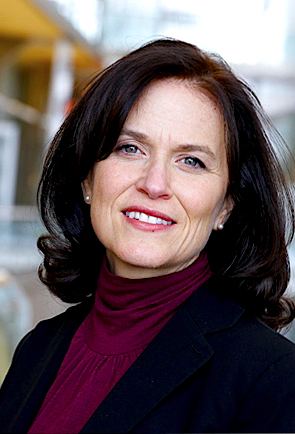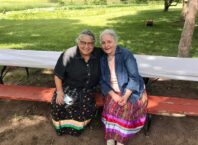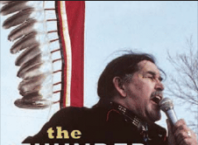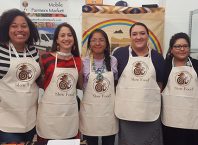 After a sound victory in the Nov. 5
After a sound victory in the Nov. 5
election, Minneapolis Mayor Betsy Hodges is looking forward to
working on her goals for education, building relationships with the
Native American community in Minneapolis and across the state.
In
an interview, Hodges said she intends on keeping pre-Kindergarten
development a priority as a means to make sure education is ingrained
in children from an early age. “My Cradle to K Initiative,
I’m really excited about. We already do good work here at the city,
working with pregnant mothers and those children in the first couple
years of life to make sure they’re growing in a healthy way and have
good, healthy brain development and seeing what we can do to bring
people together to forward the agenda to expand that program,” she
said. “So I’m excited about that because that’s the first disparity
that a kid faces, are they getting a healthy start, do they have the
brain development that they need?”
As mayor of the largest city in the
state and in the region, Hodges acknowledges the influence her office
brings to education. “I have the largest platform in the region and
the biggest bullhorn in the region and will be using it around these
education issues to pull people around the table and make sure that
we are moving the dial on these outcomes for children of color in
Minneapolis public schools.”
On
tribal issues, the new mayor has admits that she has some catch-up
learning to do, but that she looks forward to building bridges. “I
have not yet forged those relationships but that is part of my
intention, moving forward, meeting with the leadership and talk about
what the needs are. I know the urban offices from the tribes are one
of the places I want to start, knowing that they are the equivalent
of embassies here,” she said. “In knowing that they are the
representatives of the reservations here in the city – where there
are so many urban Native American folks who have their tribal
memberships and look to the urban offices for assistance – and that
is a government-to-government relationship that I’m going to foster.”
Among
the swath of candidates for mayor, the issue of gaming became a
dividing point for some, to the point of entertaining the possibility
of city gaming efforts to drive the local economy. For Hodges, it was
a simple matter of history and law. “For me, there’s not
gaming without the tribes and so holding that perspective as various
proposals move forward is one of the key things I can do as mayor.
The clear decision has been made about the relationship between is
that that is the purview of the tribes in the state of Minnesota and
we need to honor and respect that on all fronts.”
Her
position on gaming and tribal relations are formed by her
understanding of history as well as the realities of that dynamic.
“It’s a shameful history and I think it’s something that
white people are still grappling with, whether we know it or not,
frankly. And that the more we can put it on the table – really talk
about it – really talk about it in context of growth with one
another and looking to the future; knowing that the future is being
shaped by the past and that the present has been shaped by the past
in a way that has been very, very hard on the Native American
community, to put it lightly,” she said. “Acknowledging
that and moving forward from there, and knowing that change continues
to be needed and that we – the non-Native community have to move
the dial ourselves with ourselves – to make sure we are valuing our
neighbors as we ought, creating the opportunities that need
creating.”
Hodges
maintains her existing relationship with the urban Native community
and says she looks forward to addressing the relevant issues in a way
that’s realistic. “There’s so much great work happening in the
Native American community right now with so many great minds and
hearts, building not just the community but building Minneapolis. The
work that’s happening at Little Earth, work that’s happening all
across the city is work that’s building our city and I’m really
excited about it.”
She
continued, “I ran very clearly on a platform of building and
growing the city and doing with, and by, and for everybody. And for
me that clearly and very explicitly includes the Native American
community in Minneapolis. And so I want to make sure I work with the
community to help the community prosper to help our kids grow up
healthy and have great opportunities.” But even with high hopes,
she understands the reality of the situation. “I know those are the
things that people say … but we have to start with what that vision
is. And it is my commitment to operationalizing that in a way that
moves the dial as far as we can. Starting from there and knowing that
some of the key issues that I heard about from the community were
about education, jobs, opportunities and police relationships. And
so, moving forward on those in general for the city is something I’m
going to be doing. But specifically to the Native American community,
knowing that those needs are specific and our solutions have to be
specific as well.”
She keeps the rocky terrain about
police relationships in mind, but said she acknowledges that
improvements can always be made. Specifically, she outlined her work
with Police Chief Janee Harteau. “I think [she] is fantastic, she
and I are forging a very good relationship with one another, I was
very proud to support her; I think she gets it, I think she gets that
community relations are very important and that we’ve been very good
at being a high-tech police dept and we’ve gotten a a lot of great
results that way. But we need to be a high-touch police department,
so that those officers need to be out of the cars, interacting with
people. We need to be fostering those relationships as well so as to
build and rebuild trust between the community and the police
department.”
One of the ways Hodges sees at
building that relationship is fostering trust through the body camera
program that has taken hold in cities like San Francisco. “I found
money in the budget for the body cam program that should we move
forward on that, and I anticipate that we will, that we have the
dollars in place to do it and do it well. Because in other cities,
it’s really transformed the community’s relationship with the police
and vice versa, complaints go down and use of force goes down.”
The mayor said the city draws
strength from its Native community. “I am proud of the fact that we
have the largest urban American Indian population in the country.
That’s a huge asset for our city; the perspective that you bring from
other places, I think it gives you a different vantage point, you’d
bring a different world view to solutions to challenges that we
face.”
To that end, Hodges encourages
members of the Native community to stay involved in city government
as a means to keep her administration informed. “I would encourage
involvement in the Neighborhood & Community Engagement
Commission. That’s one of the things that when we put the NCEC
together, I was the one who put the resolution out there that one of
the things they’re charged with is looking into and telling us how to
better diversify the folks who are applying for city boards and
commissions. I just think that’s crucial and would love increased
participation from the Native comm, I think that would be wonderful.”






